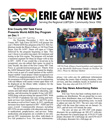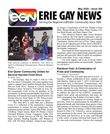The ID Divide: New MAP Report Examines How Barriers to ID Harm Different Communities and Impact Everyone
Identity documents (IDs) like driver's licenses are keys that unlock virtually every aspect of daily life, but there are many barriers to obtaining ID, affecting everyone but impacting different communities in different ways. A complicated patchwork of policies, combined with unnecessarily high fees and ongoing discrimination, mean that millions of people are unable to access some of the most basic needs and services or to participate in everyday life, simply because they don't have a valid ID.
A new report released today by the Movement Advancement Project (MAP) details the ways that barriers to obtaining an accurate ID significantly impact people's ability to move through their daily lives and how these obstacles impact specific communities.
This report, The ID Divide: How Barriers to ID Impact Different Communities and Affect Everyone, is a robust cross-population analysis and recommends systemic solutions to remove barriers and improve access to IDs. This report illustrates clear, achievable ID policies that promote public safety and good governance while still ensuring that people can have their basic needs met and have an equal opportunity to participate in civic and everyday life.
Overall, roughly one in eight adults in this country-nearly 30 million people-lack a valid driver's license, one of the most common forms of ID. An estimated 15-18 million adults in the United States-more than the total population of Pennsylvania-do not have access to documents proving their birth or citizenship, which are often necessary to obtain an ID.
"Many of us only think of needing ID at the airport or to buy alcohol. But millions of people around the country, from all kinds of backgrounds and walks of life, are stuck in a complicated maze where they don't have access to one form of ID needed to get another form of ID. As a result, they face one locked door after another in accessing basic needs like getting a job, finding a place to live, or even getting vaccinated. The communities that bear the brunt of barriers and challenges with ID are those that have faced ongoing discrimination and who are often the most vulnerable," said Logan Casey, Senior Policy Researcher and Advisor at MAP, and author of the report.
While obstacles to ID impact everyone, the report includes a detailed look at the unique ways that certain communities are disparately impacted and harmed by obstacles to ID: transgender and nonbinary people, Black communities, Indigenous and Native communities, immigrants, low-income people, people experiencing housing instability or homelessness, and people who were formerly incarcerated.
For example, while roughly 12% of U.S. adults nationwide lack a valid driver's license, this varies widely across communities: an estimated 21% of Black adults, 23% of Hispanic adults, and 68% of transgender people don't have a valid, accurate driver's license. (Click here for spotlights on how these and other communities are uniquely impacted by barriers to ID.)
Case studies
The report also includes case studies of how barriers to ID harm these and all communities, such as in Flint, Michigan, during the lead water crisis, when residents without photo ID were initially unable to pick up water and filtration supplies supplied by the state. Undocumented immigrants - who are banned from getting driver's licenses in Michigan - and other people without photo ID were turned away from clean water sites. Additionally, when states required an ID or proof of residency to receive COVID-19 tests or the vaccine, it endangered the health of both individuals without ID as well as the broader community around them.
Obstacles to getting or updating identity documents often overlap and exacerbate one another.
The report lays out these overlapping barriers which include:
- Complicated and circular documentation requirements: Getting or updating an ID usually requires extensive paperwork, which not everyone may have or be able to access. Additionally, these requirements often include another form of ID, such as requiring a birth certificate to get a driver's license, or a driver's license to get a copy of a birth certificate.
- Needlessly expensive: The cost of getting or updating an ID is a barrier, especially for low-income people, and given that costs can quickly snowball as ID requirements frequently build on one another. For example, in 15 states it would take between 4-6 hours of minimum wage work to earn enough to cover the cost of a driver's license fee; in Georgia, Washington and seven other states, it would take more than six hours-nearly a full day's work.
- Limited availability of ID services: Getting or updating ID often means visiting a government office during work hours and traveling a distance. This is more difficult for people in rural areas and people without reliable transportation.
Additionally, a confusing patchwork of state policies and long histories of discrimination impact who can access IDs. For example:
- One-third of states either don't allow or severely limit transgender and nonbinary people's ability to change the gender on their birth certificate, as outlined in MAP's LGBTQ Equality Map for identity documents. Additionally, one in six states has discriminatory policies for updating the gender marker on a driver's license.
- Eighteen states allow any person who qualifies to get a driver's license, regardless of their immigration status. But undocumented immigrants are still unable to get a state ID in most states.
- Nearly one in four eligible voters live in a state with ID requirements to vote, with 10 states requiring photo ID, as shown in MAP's Democracy Maps. These kinds of policies are designed to restrict people's ability to vote, with a distinct impact on Black voters, low-income voters, and Native Americans.
Recommendations
The ID Divide offers recommendations to reduce obstacles to ID and improve access for everyone. An overarching recommendation is for policymakers to carefully determine when an ID is truly necessary and when requiring it might limit access to basic needs and essential services. A detailed set of recommendations for policymakers include ways to:
- Simplify documentation requirements and processes
- Reduce the needlessly expensive costs of obtaining and updating IDs
- Increase access to ID services and IDs themselves
- Set nationwide standards for ID accessibility for all
- Reduce discrimination in ID policies and administration
Read more about how the following communities are disparately impacted by barriers to ID in the following spotlights:
- Transgender and nonbinary people
- Black communities
- Indigenous and Native communities
- Immigrants
- Low-income people
- People experiencing housing instability or homelessness
- Formerly incarcerated people
To schedule an interview with a MAP researcher or for questions please contact Rebecca Farmer at rebecca@mapresearch.org.
About MAP: MAP's mission is to provide independent and rigorous research, insight and communications that help speed equality and opportunity for all. MAP works to ensure that all people have a fair chance to pursue health and happiness, earn a living, take care of the ones they love, be safe in their communities, and participate in civic life. www.mapresearch.org





